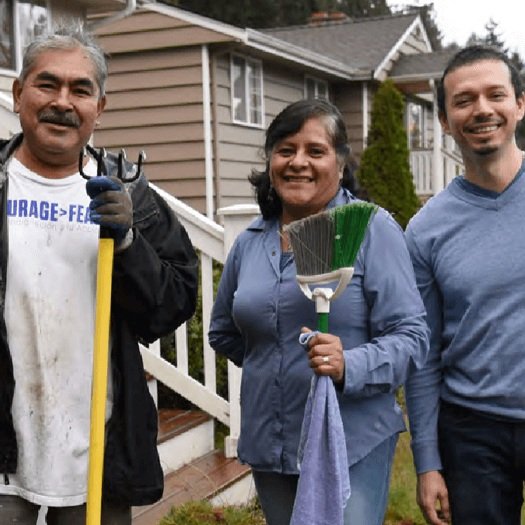OUR COMMITMENT
Centering Equity in Search
At Clover Search Works, we believe that equity in search is not just a goal—it's a necessity for creating truly inclusive and effective organizations.
Equitable search practices are fundamental to addressing and dismantling the long-standing effects of systemic oppression, including racism, sexism, and other forms of discrimination that have shaped our institutions and societies. We recognize that these historical injustices have created persistent barriers, limiting opportunities for marginalized groups and skewing leadership representation. By centering equity in our searches, we strive to ensure that leadership truly reflects the diverse communities being served, fostering trust, understanding, and more responsive decision-making. Diverse leadership at all levels is crucial for building stronger, more adaptable organizations capable of navigating our complex, multicultural world.
As search facilitators, we recognize the tremendous power we have to influence hiring decisions, and we embrace our responsibility to work with our clients to center equity in every search. We see this as our role in creating a more just and equitable professional landscape.
Both as a search firm and as individuals, we acknowledge that we will always be works-in-progress. We commit to ongoing self- and group-reflection, examination of our biases, and continuous learning to promote equity in the search process. We ask the same commitment from our clients, knowing that together, we can create meaningful change in leadership representation and organizational culture.
Photo courtesy N. M. Bodecker Foundation by Christine Dong
Mitigating Bias At Every Stage
Bias can enter the search process at nearly every juncture, when we often must make decisions about people based on very limited information. Mitigating bias requires time and intentionality. Some of the strategies we implement in every search include:
Recognizing that inclusivity takes time.
Cutting corners and trying to move through a search too quickly will almost always come at the expense of inclusion and community-building.Ensuring a diversity of perspectives are at the table.
Assembling a diverse search committee that includes staff helps to ensure a variety of perspectives are part of the conversation and informs equity-based decision making.Embedding equity training.
Facilitating search committee discussions and/or training specifically related to equity and anti-bias in the search process so that the team is better able to center equity at each stage.Reducing unnecessary gatekeeping.
Examining and eliminating unnecessary requirements that may limit the applicant pool - everything from having a particular degree to the ability to lift 25 lbs.Broadening qualification criteria.
Building search criteria that take into account the multitude of ways a candidate may gain skills and experiences relevant to the role, beyond advanced degrees or a traditional career path.Championing authentic representation.
Clearly articulating specific equity-related skills, lived experiences and community connections needed for the role, enabling candidates to showcase their genuine commitment and expertise.Promoting pay transparency.
Disclosing salary ranges in all announcements to help level the playing field for historically underpaid and underrepresented applicants.Highlighting the organization’s equity commitment.
Creating job announcements that are explicit about an organization’s commitment to equity, so that potential candidates can envision themselves thriving in an environment committed to equity.Diversifying candidate outreach.
Actively posting job openings on inclusive and diverse job boards, social media groups, and listservs to reach a diverse candidate pool.Cultivating candidate relationships.
Making ourselves readily available to answer questions and/or meet with all potential candidates, as well as exploring innovative ways to reach new audiences.Employing multi-perspective resume screening.
Ensuring multiple team members carefully review each resume to reduce the risk of overlooking potentially strong candidates due to individual bias.Tailoring screening and interviewing for diverse strengths.
Designing a screening process and interviewing rounds that recognize different candidates shine in different settings.Minimizing uncompensated candidate labor.
Limiting candidate's uncompensated time and effort in a search, and/or compensating finalist candidates for their time.
Photo courtesy Casa Latina
Photo courtesy of Team Read
Photo courtesy N. M. Bodecker Foundation by Tanya Cerda
Photo courtesy of FEPPS
We work closely with our clients to identify additional, organization-specific steps we can take to promote equity. As we learn from each search, this list continues to grow.
Challenging Ourselves To Grow
As we engage in this ongoing learning process, we encounter hard questions that must be addressed, even when they make us uncomfortable or lack easy answers. Some of the questions we are currently grappling with include:
How do we balance our role as neutral search facilitators with our commitment to promoting inclusive hiring practices and helping search committees recognize and mitigate their own biases?
How can we respectfully and authentically engage with BIPOC communities to share job opportunities, without overburdening or exploiting personal connections for repeated referrals and introductions?
How can we foster effective collaborations with consultants or other colleagues who have deep community knowledge but limited search experience, leveraging their insights while working together for mutual benefit?
How can we balance the desire to connect BIPOC candidates with job opportunities while ensuring we are not steering them towards organizations that may not yet have a very equitable and inclusive organizational culture?
How can we guide organizations to create support structures that empower and uplift leaders of color, acknowledging and addressing systemic barriers, without implying a deficit in the leaders themselves?
How can we help search clients understand that hiring BIPOC leaders should be driven by a genuine commitment to equity and the value these leaders bring, rather than a superficial response to funders' preferences, in order to avoid tokenization and create authentic opportunities for BIPOC leadership?
We invite our clients, candidates, and colleagues to join us in wrestling with these complex issues as we work together to create more equitable search processes and outcomes.
Learning from Others
We continually seek out resources and perspectives to inform our equity journey. This list, while not comprehensive, includes articles we have found useful and thought-provoking.
Holding Ourselves Accountable
To hold ourselves accountable to our values, we have developed an internal equity work plan. We dedicate time at every staff meeting to reflect on our work, share new learnings, and check our progress towards our equity goals.
Please feel free to reach out if you have any questions or would like to learn more about our commitment to equity in the search process.






